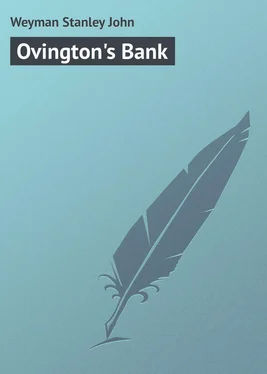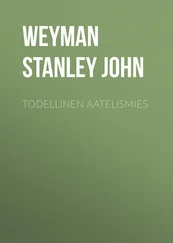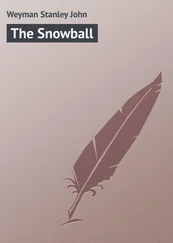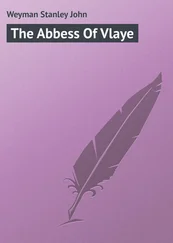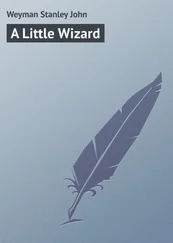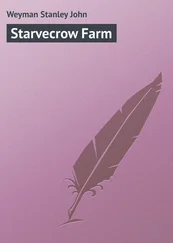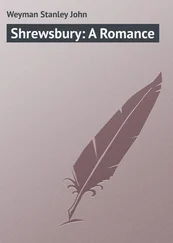Stanley Weyman - Ovington's Bank
Здесь есть возможность читать онлайн «Stanley Weyman - Ovington's Bank» — ознакомительный отрывок электронной книги совершенно бесплатно, а после прочтения отрывка купить полную версию. В некоторых случаях можно слушать аудио, скачать через торрент в формате fb2 и присутствует краткое содержание. Издательство: Иностранный паблик, Жанр: foreign_language, foreign_prose, на английском языке. Описание произведения, (предисловие) а так же отзывы посетителей доступны на портале библиотеки ЛибКат.
- Название:Ovington's Bank
- Автор:
- Издательство:Иностранный паблик
- Жанр:
- Год:неизвестен
- ISBN:нет данных
- Рейтинг книги:5 / 5. Голосов: 1
-
Избранное:Добавить в избранное
- Отзывы:
-
Ваша оценка:
- 100
- 1
- 2
- 3
- 4
- 5
Ovington's Bank: краткое содержание, описание и аннотация
Предлагаем к чтению аннотацию, описание, краткое содержание или предисловие (зависит от того, что написал сам автор книги «Ovington's Bank»). Если вы не нашли необходимую информацию о книге — напишите в комментариях, мы постараемся отыскать её.
Ovington's Bank — читать онлайн ознакомительный отрывок
Ниже представлен текст книги, разбитый по страницам. Система сохранения места последней прочитанной страницы, позволяет с удобством читать онлайн бесплатно книгу «Ovington's Bank», без необходимости каждый раз заново искать на чём Вы остановились. Поставьте закладку, и сможете в любой момент перейти на страницу, на которой закончили чтение.
Интервал:
Закладка:
"And a mighty poor time she had of it," Arthur answered, half carelessly, half contemptuously. "Poor Jos! She hasn't at any time much of a life with my beauty of an uncle. Twopence to get and a penny to spend!"
Mrs. Bourdillon protested. "I do wish you would not talk of your cousin like that," she said. "You know that she's your uncle's heiress, and if you only-"
Arthur cut her short. "There! There! You don't remember, mother, that Clement has seven miles to ride before his supper. Let him go now! He'll be late enough."
That was the end, and the two young men went out together. When Arthur returned, the tea had been removed and his mother was seated at her tambour work. He took his stand before the fire. "Confounded old screw!" he fumed. "Thirty pounds a year? And he's three thousand, if he's a penny! And more likely four!"
"Well, it may be yours some day," with a sniff. "I'm sure Jos is ready enough."
"She'll have to do as he tells her."
"But Garth must be hers."
"And still she'll have to do as he tells her. Don't you know yet, mother, that Jos has no more will than a mouse? But never mind, we can afford his thirty pounds. Ovington is giving me a hundred and fifty, and I'm to have another hundred as secretary to this new Company-that's news for you. With your two hundred and fifty we shall be able to pay his rent and still be better off than before. I shall buy a nag-Packham has one to sell-and move to better rooms in town."
"But you'll still be in that dreadful bank," Mrs. Bourdillon sighed. "Really, Arthur, with so much money it seems a pity you should lower yourself to it."
He had some admirable qualities besides the gaiety, the alertness, the good looks that charmed all comers; ay, and besides the rather uncommon head for figures and for business which came, perhaps, of his Huguenot ancestry, and had commended him to the banker. Of these qualities patience with his mother was one. So, instead of snubbing her, "Why dreadful?" he asked good-humoredly. "Because all our county fogies look down on it? Because having nothing but land, and drawing all their importance from land, they're jealous of the money that is shouldering them out and threatening their pride of place? Listen to me, mother. There is a change coming! Whether they see it or not, and I think they do see it, there is a change coming, and stiff as they hold themselves, they will have to give way to it. Three thousand a year? Four thousand? Why, if Ovington lives another ten years what do you think that he will be worth? Not three thousand a year, but ten, fifteen, twenty thousand!"
"Arthur!"
"It is true, mother. Ay, twenty, it is possible! And do you think that when he can buy up half a dozen of these thickheaded Squires who can just add two to two and make four-that he'll not count? Do you think that they'll be able to put him on one side? No! And they know it. They see that the big manufacturers and the big ironmasters and the big bankers who are putting together hundreds of thousands are going to push in among them and can't be kept out! And therefore trade, as they call it, stinks in their nostrils!"
"Oh, Arthur, how horrid!" Mrs. Bourdillon protested, "you are growing as coarse as your uncle. And I'm sure we don't want a lot of vulgar purse-proud-"
"Purse-proud? And what is the Squire? Land-proud! But," growing more calm, "never mind that. You will take a different view when I tell you something that I heard to-day. Ovington let drop a word about a partnership."
"La, Arthur, but-"
"A partnership! Nothing definite, nothing to bind, and not yet, but in the future. It was but a hint. But think of it, mother! It is what I have been aiming at all along, but I didn't expect to hear of it yet. Not one or two hundred a year, but say, five hundred to begin with, and three, four, five thousand by and by! Five thousand!" His eyes sparkled and he threw back the hair from his forehead with a characteristic gesture. "Five thousand a year! Think of that and don't talk to me of Orders. Take Orders! Be a beggarly parson while I have that in my power, and in my power while I am still young! For trust me, with Ovington at the helm and the tide at flood we shall move. We shall move, mother! The money is there, lying there, lying everywhere to be picked up. And we shall pick it up."
"You take my breath away!" his mother protested, her faded, delicate face unusually flushed. "Five thousand a year! Gracious me! Why, it is more than your uncle has!" She raised her mittened hands in protest. "Oh, it is impossible!" The vision overcame her.
But "It is perfectly possible," he repeated. "Clement is of no use. He is for ever wanting to be out of doors-a farmer spoiled. Rodd's a mere mechanic. Ovington cannot do it all, and he sees it. He must have someone he can trust. And then it is not only that I suit him. I am what he is not-a gentleman."
"If you could have it without going to the bank!" Mrs. Bourdillon said. And she sighed, golden as was the vision. But before they parted his eloquence had almost persuaded her. She had heard such things, had listened to such hopes, had been dazzled by such sums that she was well-nigh reconciled even to that which the old Squire dubbed "the trade of usury."
CHAPTER III
Meanwhile Clement Ovington jogged homeward through the darkness, his thoughts divided between the discussion at which he had made an unwilling third, and the objects about him which were never without interest for this young man. He had an ear, and a very sharp one, for the piping of the pee-wits in the low land by the river, and the owl's cadenced cry in the trees about Garth. He marked the stars shining in a depth of heaven opened amid the flying wrack of clouds; he picked out Jupiter sailing with supreme dominion, and the Dog-star travelling across the southern tract. His eye caught the gleam of water on a meadow, and he reflected that old Gregory would never do any good with that ground until he made some stone drains in it. Not a sound in the sleeping woods, not the barking of a dog at a lonely homestead-and he knew every farm by name and sight and quality-escaped him; nor the shape of a covert, blurred though it was and leafless. But amid all these interests, and more than once, his thoughts as he rode turned inwards, and he pictured the face of the girl at the ball. Long forgotten, it recurred to him with strange persistence.
He was an out-of-door man, and that, in his position, was the pity of it. Aldersbury School-and Aldersbury was a very famous school in those days-and Cambridge had done little to alter the tendency: possibly the latter, seated in the midst of wide open spaces, under a wide sky, the fens its neighbors, had done something to strengthen his bent. Bourdillon thought of him with contempt, as a clodhopper, a rustic, hinting that he was a throwback to an ancestor, not too remote, who had followed the plough and whistled for want of thought. But he did Clement an injustice. It was possible that in his love of the soil he was a throwback; he would have made, and indeed he was, a good ploughman. He had learnt the trick with avidity, giving good money, solid silver shillings, that Hodge might rest while he worked. But, a ploughman, he would not have turned a clod without noticing its quality, nor sown a seed without considering its fitness, nor observed a rare plant without wondering why it grew in that position, nor looked up without drawing from the sky some sign of the weather or the hour. Much less would he have gazed down a woodland glade, flecked with sunlight, without perceiving its beauty.
He was, indeed, both in practice and theory a lover of Nature; breathing freely its open air, understanding its moods, asking nothing better than to be allowed to turn them to his purpose. Though he was no great reader, he read Wordsworth, and many a line was fixed in his memory and, on occasions when he was alone, rose to his lips.
Читать дальшеИнтервал:
Закладка:
Похожие книги на «Ovington's Bank»
Представляем Вашему вниманию похожие книги на «Ovington's Bank» списком для выбора. Мы отобрали схожую по названию и смыслу литературу в надежде предоставить читателям больше вариантов отыскать новые, интересные, ещё непрочитанные произведения.
Обсуждение, отзывы о книге «Ovington's Bank» и просто собственные мнения читателей. Оставьте ваши комментарии, напишите, что Вы думаете о произведении, его смысле или главных героях. Укажите что конкретно понравилось, а что нет, и почему Вы так считаете.
